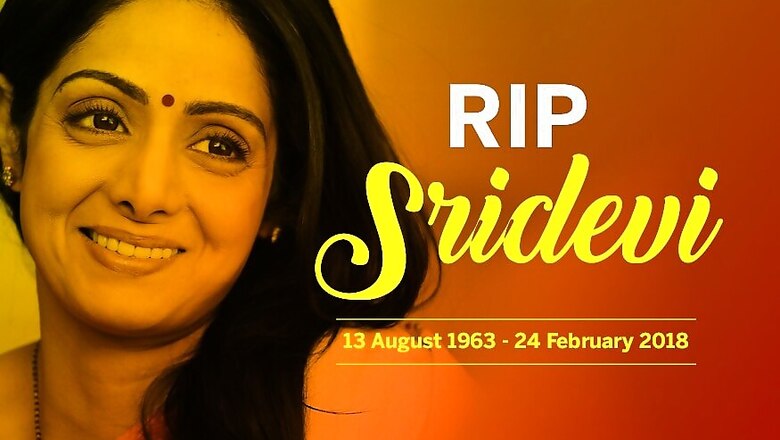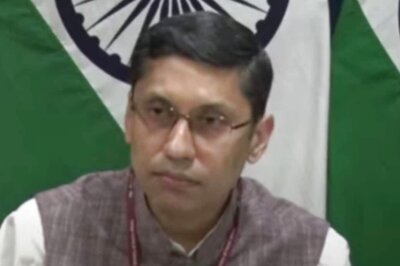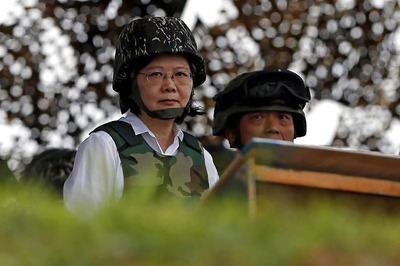
views
Some deaths shock you. When the Bollywood heartthrob, Dev Anand, died in London in December 2011, it hit us all. Yes, he was all of 88, but many of us are caught in a time warp, and we feel that our favorite heroes and heroines will live forever. And Sridevi was not even old, barely 54 – when a joyous marriage celebration of her nephew, Mohit Marwah, in Dubai turned into mourning.
On February 24, a cardiac arrest felled Sridevi, cutting short a career that she had just got re-rolling in 2012 with English Vinglish. This Hindi film came after a 15-year hiatus, and had not just an interesting plot, but also a great performance by an actress who was legendarily known as an interviewer's nightmare, but a viewer's delight. Absolute delight.
As Shashi Godbole in Gauri Shinde's debut feature, English Vinglish, Sridevi stole hearts with her almost herculean achievement of mastering English during a four-week crash course in New York. Ridiculed by her husband and daughter for her poor language skills, Shashi surprises her family – transforming herself from a homemaker, selling laddoos to earn a bit of money on the side, into an epitome of confidence with her new-found mastery over English. The change from a hesitant housewife to a bolder woman was portrayed with remarkable conviction by a Sridevi who had not faced the camera in ages. She was hailed as the Meryl Streep of India, and some even called her the female Rajinikanth of Japan. A Padma Shri came, and she was voted as India's best actress in 100 years at a poll conducted by CNN-IBN (as it was then known) in 2013 to mark the centenary of Indian cinema.
Of course, we would never know why she chose to slip into the shadows for that decade and half, before English Vinglish came on. The official version is all that we have: playing a perfect wife to Bonney Kapoor, whom she married in 1996, and a doting mother to her two daughters, Jahnvi and Khushi.
She doted on her girls all right, and I have wondered sometimes whether this love helped her to clinch brilliance in her 300th film, Mom (2013), helmed by Ravi Udyawar – where she plays a vigilante mother, who wrecks havoc on the lives of four men guilty of raping her daughter and throwing her into a roadside ditch. The girl recovers and even identifies her attackers, but the court acquits them after confirming that she was under the influence of alcohol and her memory might not have been reliable.
Sridevi, essaying Devki Sabarwal, is shattered and knows that her stepdaughter, Arya, will merely keep walking away from a meaningful relationship. And then pushed, Devki turns into a virtual demon and takes it upon herself to finish the four rapists. She thinks of the most ingenious methods to murder them, and with the help of a private detective (an unrecognisable Nawazuddin Siddiqui) she moves like a panther, and despite Akshay Khanna's cop hot on her trail, she vanquishes all.
I certainly had moral qualms about Mom's methods, and felt – much like I have been feeling about the Madhavan-starrer web serial, Breathe – that the means do not justify the end. And in Mom, the climax is all the more questionable with the policeman himself helping Devki shoot the last rapist!
(How very different Mom is from the Hollywood feature, Three Billboards Outside Ebbing, Missouri, also about a mother grieving over the rape and murder of her teenage daughter, but a mother who devices an extraordinary plan to shake her little town out of its slumber – a plan that is not morally debased).
However, Sridevi's performance, much like Frances McDormand's in Three Billboards..., was riveting as a woman singularly adoring of her daughter – a love that would not stop her from waking up to the very precipice to dispense her brand of justice.
Of course, not many would now remember that Sridevi had a sparkling early innings in Tamil cinema. And her first movie as a leading lady was 1976's Moondru Mudichu, a fascinating revenge drama helmed by the legendary K. Balachander. As a young woman, Sridevi's Selvi, is devastated when she see Rajinikanth's Prashanth refusing to save his best friend, Balaji (Kamal Hassan), when he falls off a boat in the middle of a lake. In love with Balaji, Selvi understands Prashant's ulterior motive, and sets upon to seek revenge later by marrying his father!
Paradoxically, Sridevi's first and final work would harp on revenge.
Movies like 16 Vayathinile, Meendum Kokila and Johnny undoubtedly laid the ground for Sridevi's splendid sojourn. Not only was she paired with real greats like Kamal Haasan and Rajinikanth (who was once superb, and it was only later, he began to slip into gimmickry) but also had the great fortune of being directed by extraordinarily talented men like Balachander, J. Mahendran and Bharathiraja.
In Bharathiraja's 16 Vayathinile, Sridevi is torn between two men, a lame Kamal, who is the butt of village jokes and an urbane veterinarian. She conveys the dilemma with remarkable fortitude, and helped the film attain a cult status. It is still considered as one of the best works portraying most realistically Tamil Nadu's rural life.
In the 1981 Meendum Kokila, Sridevi plays the wronged wife, who finally wins over the affections of her lawyer husband (Haasan). It was gripping to watch a woman whose determination to get her wayward husband back home – much like it was seeing her play the ruthlessly reckless Devki.
In Mahendran's Johnny, Sridevi paired with Rajinikanth (in a dual role) is a singer, who walks into confusion and chaos when the two men pass off as each other. In a role that was an emotional high point of her first steps into her career, Sridevi is still remembered for the angst and anxiety she infused into her character.
And who can ever forget her in Balu Mahendra's Moondram Pirai (1982), where she slips into retrograde amnesia and becomes childlike, and is taken under the care of a schoolteacher (Kamal). Tending to her childish fantasies for several months, he falls in love with her, and in the end when she regains her memory, the scene of their parting is what great love stories are made of. The now-cured woman has no inkling of her care-giver and goes away without even a goodbye -- with a Haasan trying desperately to evoke her intermediary memory.
Undoubtedly an incredible performer, Sridevi was born in Sivakasi to a Tamil father and a Telugu mother, and she first appeared on screen as a four-year-old child, essaying Lord Muruga. Little would have anybody then guessed that the child would go on to light the screen with her firecracker luminosity.
(Gautaman Bhaskaran is an author, commentator and movie critic, and may be e-mailed at [email protected] )
















Comments
0 comment